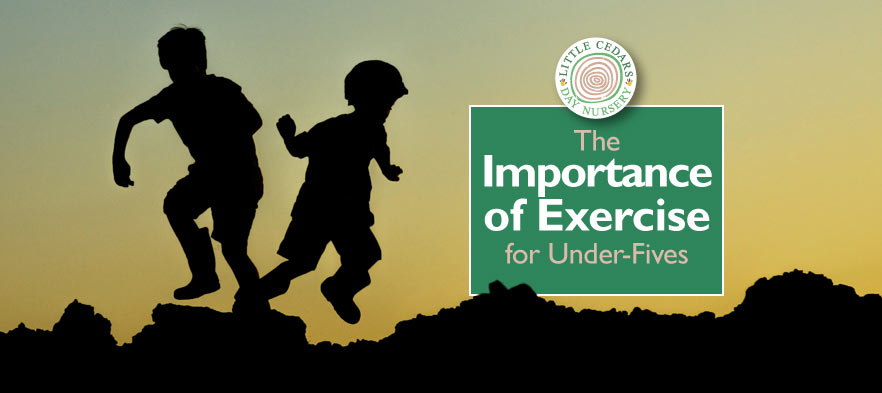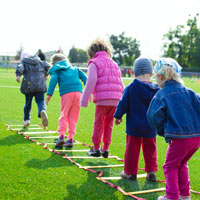
It’s accepted that regular exercise and keeping active are important to human health. This also applies to children under five — in fact it’s incredibly important during this crucial time in their development. In this article, we’ll take a look at the many benefits of exercise for the very young — and how much physical activity is recommended for toddlers and children in their early years.
 What are the Recommendations for Early Years Exercise?
What are the Recommendations for Early Years Exercise?
The UK’s National Health Service (NHS) recommends1 that children under five should engage in at least 3 hours of physical activity each day, spread out over the course of the day. They go on to say:
“Children under the age of 5 should avoid being inactive for long periods. Watching TV for hours or being strapped into a buggy for too long isn’t good for their health and development.” (NHS)
This should come as no surprise, of course, but it’s important to take on board; official guidance is likely to be based upon decades of historical health data.
Meanwhile, as cited in Downing Street’s 2017 ‘Action Plan’ to fight childhood obesity, the UK’s chief medical officers also recommended 180 minutes (3 hours) of physical activity for children under five. (CMO UK Physical Activity Guidelines). Once again the suggestion is that this should be spread out through the day.
 What are the Benefits of Early Years Exercise?
What are the Benefits of Early Years Exercise?
Exercise and physical activity in preschoolers and under-fives has many benefits. These include:
- Firstly, it’s great fun for children! Indeed, energetic games and activities for young kids should be seen as an essential part of childhood.
- It helps build up muscle strength and fitness.
- It helps children to develop stronger bones.
- Right from birth, physical activity and movement are significant in the creation of nerve connections in the brain
- It naturally burns off calories that have been consumed by children through food/drink intake. This is particularly important if they have been ingesting superfluous calories or less-than-healthy things like sweets, sugary drinks or fatty junk food (although it’s best to avoid those, of course).
- Regular exercise, in tandem with healthy eating, thereby helps children to maintain healthy weights and body mass indices. This is important because overweight youngsters are more prone to become overweight adults. It’s therefore an excellent approach to nip any weight problems in the bud, at this early age.
- Avoiding weight problems through regular physical activity — and healthy, balanced eating — also helps reduce the likelihood of heart disease, strokes and high blood pressure later in life.

- Active play helps to improve social skills, behaviour and confidence in children.
- Attention levels can also be seen to improve.
- Regular exercise also helps children’s quality of sleep.
- Physical activity helps the young to improve coordination and motor/movement skills.
- It also helps to improve children’s moods and dispositions.
So, all in all, active play, physical activities and exercise are of huge benefit to children’s physical health and mental wellbeing.
Startling Facts
“One in five children are already overweight or obese before they start school” (NHS)
“[Only] one in ten children aged two to four meets the UK chief medical officers’ physical activity guidelines for this age group.” (NHS)
 How Parents can Help
How Parents can Help
When at home, away from nursery or pre-school, parents can also encourage children to stay physically active so as to maintain their 180 minutes of active play each day. As well as all the usual activities that can be encouraged (football, netball, tag, formal exercise etc.) there are a number of excellent resources available for additional ideas. For example, Change 4 Life have a handy resource of physical activity-based games that young children can play. Even better, they’re inspired by characters from Disney and Pixar, so are going to prove very popular among the young. The character-based games are sure to inspire children to get active and have fun at the same time. Choose a game to see how it works.
“Remember, if you’re concerned about your child’s weight then your GP, practice nurse, school nurse or health visitor can give you help and advice.” (NHS advice)
 Active Play & Exercise at Little Cedars Day Nursery, Streatham
Active Play & Exercise at Little Cedars Day Nursery, Streatham
As one of the key focuses of the Early Years Foundation Stage (EYFS) framework, physical development is at the core of the curriculum at Little Cedars Day Nursery. As such, children of all ages are encouraged to exercise through active play, every single day. Children are encouraged to be physically active via a variety of well thought-out physical activities and challenges, as appropriate for their particular age group. This is all carefully orchestrated and supervised by the staff and ‘Key Person’ allocated to each particular child. A whole myriad of high quality facilities, interactive equipment and toys also help to ensure that every child has a varied range of activities to enjoy. They have immense fun while their brains, minds and bodies develop along the way.
Nursery places for babies, toddlers and children in Streatham
Are you looking for an outstanding nursery in Streatham for your child? Or perhaps you’re nearby and are looking for high quality nurseries in or near to Streatham Hill, Streatham Common, Tooting, Furzedown or Balham? If so, we currently have a few spaces left, so please do get in touch while they’re still available.

